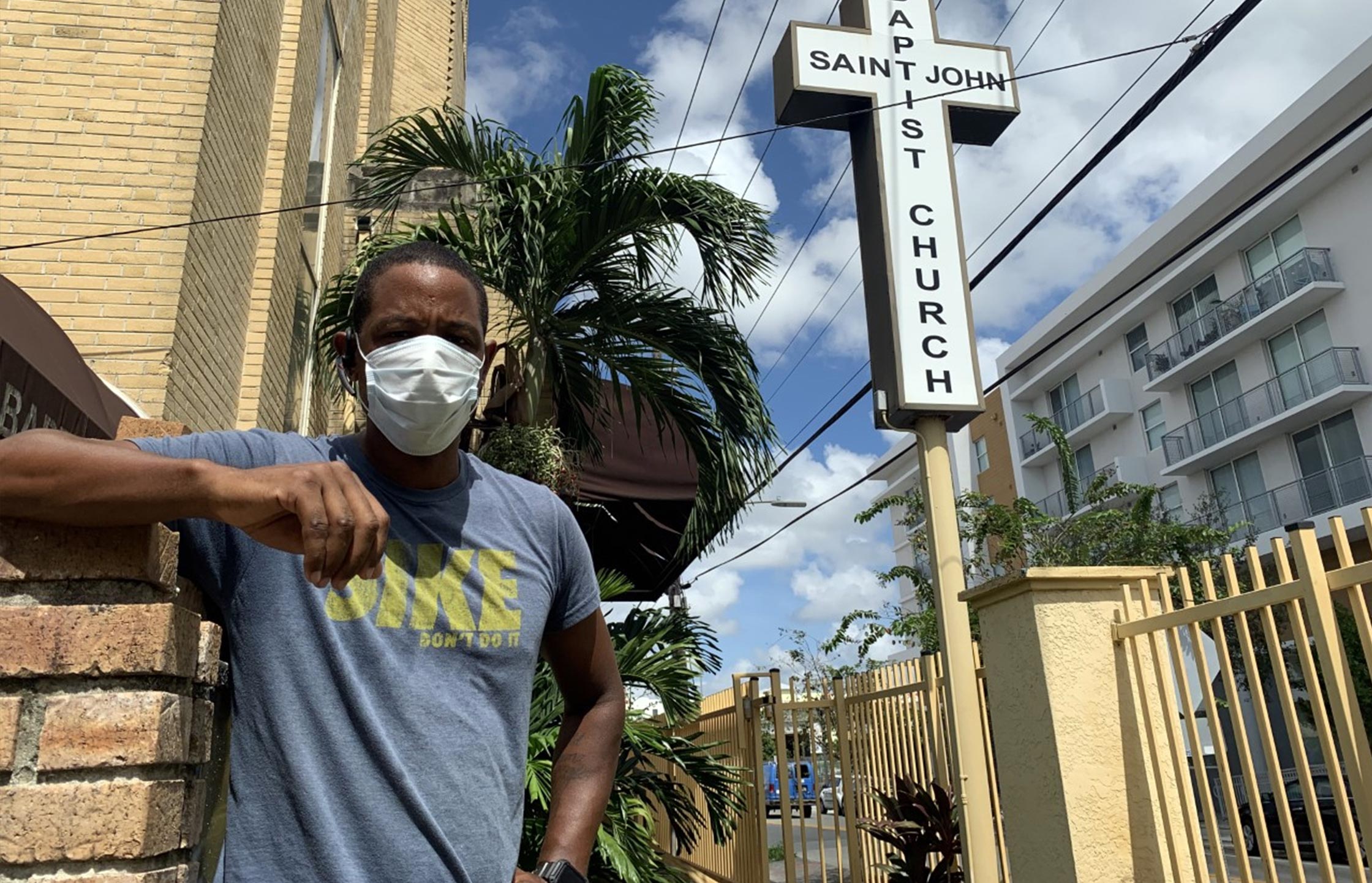A Defender
for the Homeless
When he isn’t caring for patients at UHealth Tower, Dr. Armen Henderson helps those without a place to live
By Robert C. Jones Jr.
Photography by Robert C. Jones Jr.

H
omeless for 17 years, Karen sat in the parking lot of Overtown’s historic St. John’s Baptist Church early on a Monday in late August, waiting her turn to shower and accept a handout of food.
Everything she owned was stuffed into three, large cloth bags as weather-beaten as the items they held: a few bundles of clothes, a blanket, and a pair of shoes — tattered possessions that symbolized her tough life on the streets.
Karen claimed COVID-19 doesn’t frighten her.
“Commitment has kept me safe,” she said, without elaborating on her comment.
But while Karen, who would give only her first name, may be unafraid of the virus, Armen Henderson, M.D., M.B.A., an assistant professor of medicine at the University of Miami Miller School of Medicine, is. He’s afraid for her and the thousands of other men, women, and children living on the Miami-Dade County streets who don’t have health care or even know where to get tested.
“There was a dire need to help this segment of the population before the virus began to spread,” said Dr. Henderson, a hospitalist at UHealth Tower, the University of Miami Health System’s flagship hospital. “When the pandemic hit, that need grew immensely because all of the problems the homeless face — underlying health conditions, being subjected to arrest, and put in jail where the virus can easily spread — became exacerbated.”
Helping the impoverished
As a volunteer with the Miami chapter of Dream Defenders a civil rights organization formed shortly after the death of Trayvon Martin, Dr. Henderson has sought to improve the plight of the impoverished amid the pandemic. He provides the homeless community with free COVID-19 testing, face masks and other personal protective equipment, and information and resources on the virus.
He and the chapter’s other “street team” of organizers travel to underserved communities throughout Miami-Dade to reach the homeless — from Liberty City and Overtown to Homestead and Miami Gardens.
“When the coronavirus presented itself, it was a new challenge for us,” Dr. Henderson said. “We knew we had to respond much like the response that occurs after a hurricane or other disaster.”
The team’s service site at St. John’s Baptist Church in Overtown distributes free food and clothes and provides shower and toilet facilities for the homeless. When COVID-19 testing was slow in coming to the county’s marginalized areas, Dr. Henderson helped create a database showing sites where people could get free testing.
But the organization’s funding and resources are limited. It has applied for grants and appealed to local government officials for assistance, yet the response has been slow. Now, with cooler weather on the way, Dr. Henderson is worried a spike in COVID-19 cases could occur in homeless shelters.
No stranger to poverty
Dr. Henderson understands the plight of the poor. He grew up in an impoverished Philadelphia neighborhood, often working two jobs when he was a teenager. An accomplished shooting guard on his high school basketball team, he attracted the attention of college scouts. But when he was injured, recruiters backed off.
Still, Dr. Henderson made it to college. As an undergraduate, he worked nights in a Philadelphia snack foods factory, hauling 50-pound sacks of sugar up a ladder and loading them into an industrial mixer — a process he repeated as many as 20 times a shift.
“It was tiring work,” he recalled.
One summer, taking a year off after earning his bachelor’s degree to study for the medical college admission exam, he got a job doing research in a U.S. Department of Agriculture lab.
Dr. Henderson’s experiences with the homeless hit close to home long before his volunteer work with Dream Defenders. His father and brother were once without a place to live. During his first year at Meharry Medical College, he and other students gave the homeless free pedicures to prevent infection.
“There’s a misguided belief that if you offer services to individuals who are homeless, it somehow perpetuates them staying on the street,” Dr. Henderson said. “But that’s completely false. There’s no evidence to support that in the least.”
While he knows there’s more to be done to help the homeless, he’s glad his efforts and those of other volunteers are making a difference.
“When they see our faces,” Dr. Henderson said, “they know it’s nothing but love.”![]()


